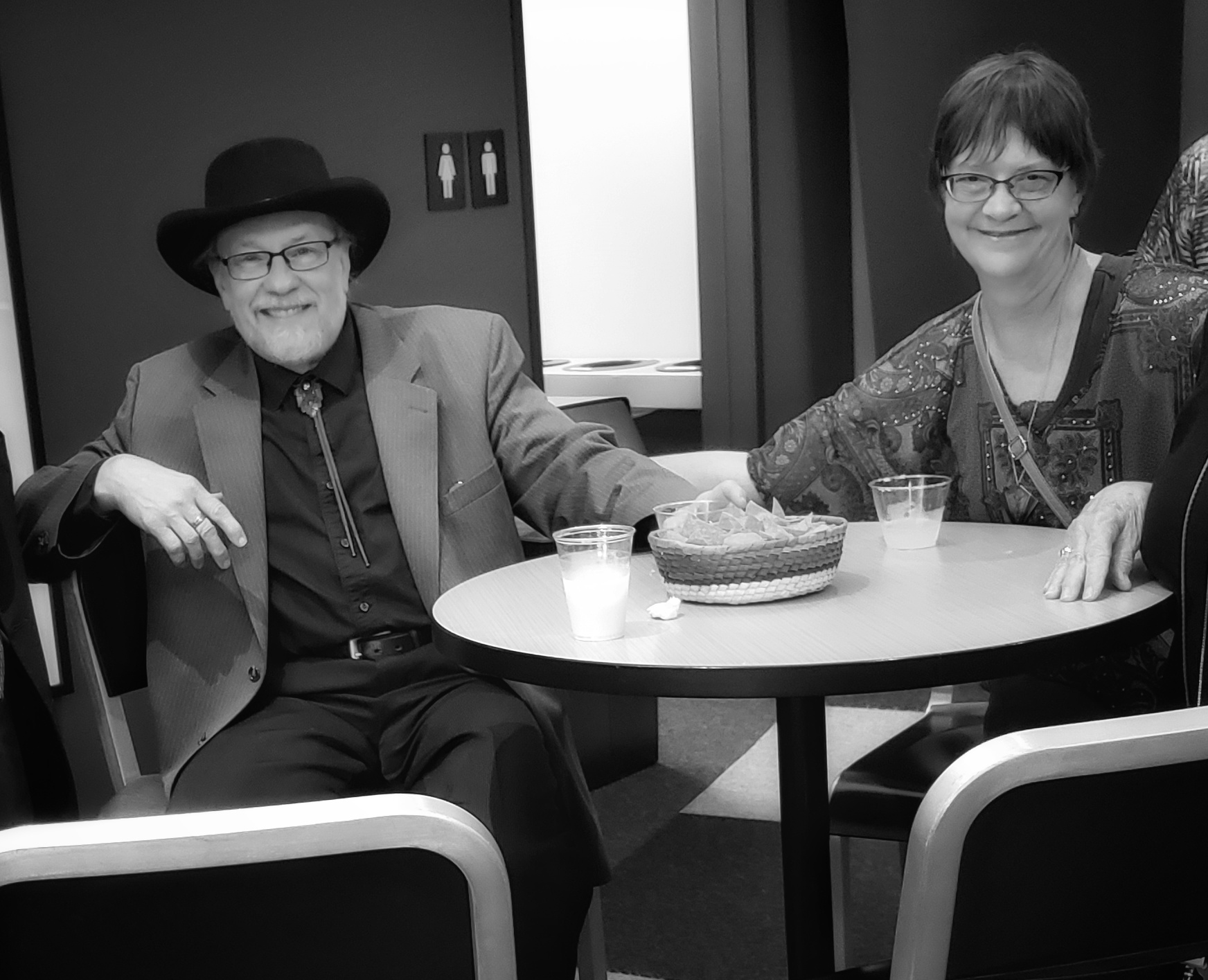Beth Moore has left the Southern Baptist Conference. If you are unaware of her and what this means, you should look into it. Beth Moore has for many years occupied a special place within that community—a preacher without portfolio, one might say, as the SBC does not permit women to hold the title “pastor.” The straight-up “pure quill” fundamentalism they espouse holds the inferred Biblical injunctions inviolable in this instance, but she has been such a forceful speaker and operates such a large organization that they are loathe to relegate her to silence. So she held that special position.
Till now.
She has split with them over Trump. The schism is instructive. Ms. Moore cannot find common ground with the majority of her colleagues over Trump.
“He became the banner, the poster child for the great white hope of evangelicalism, the salvation of the church in America,†she said. “Nothing could have prepared me for that.â€
Since 2016 she has been on the outside of the SBC over this issue. She identified Trump as an exemplar of everything they should stand against, and yet she was met with silence, then disapproval, then warnings, and finally with the loss of her publisher. She could not understand the attitude of her (male) colleagues in their support for this man she saw as a walking “poster child” for evil.
To be sure, this has puzzled those outside the evangelical camp all along. The slogans and protestations over perceived moral lapses in Democrats would seem to support a no-holds-barred moralism that should have found Trump utterly unacceptable. And yet we have been witness to very public campaigns of image rehabilitation all along. It has been with mixed incomprehension and horror that we have seen people who flew into paroxysms of condemnation over Clinton’s behavior make showings of almost servile support (bordering on worship) for a man who bragged about pussy-grabbing and attempted to pay off a porn star to keep her from talking about her paid services to him. The very public ridicule he heaped on anyone who did not fit a shallow model of Americanism that combined a host of clichés and segregated anyone who didn’t meet the standard—essentially the acts of a bully picking on the weak—seemed to gain favor with the very people who claim Jesus as their exemplar. Beth Moore saw this for what it was and tried to convince the SBC to abandon its support for him, and instead found herself more and more at odds with them, more and more isolated.
It is fair to ask what is going on with this enormous contradiction. How could the self-professed moral arbiters of the country, the Christian Right, support this?
Beth Moore’s ambiguous status holds much of the answer.
It is by now a convention that in many religions women are relegated to secondary (or lesser) status. One may puzzle about how this can still pertain in a time when the evidence for any rational justification for it has been shown to be nonexistent. Certainly it is an aspect of male privilege, but that does not satisfactorily explain the complicit acquiescence of so many women. Moore is a good example of the conundrum. (Just as with people like Michele Bachman, who espouses a paradoxical belief that women should be subservient yet she herself sees no problem with holding leadership positions.) In Moore’s case, she has been in accord with the evangelical attitudes toward women and accepted a lesser status even while she has risen to a commanding position in her community. She felt the larger message important and, no doubt, felt protected within the larger community.
But when Trump’s very public attitudes toward women became a very public issue, and she protested, that community seemed to withdraw its protection.
In my opinion, this apparent betrayal is due to a basic misunderstanding which is not only endemic to communities like the SBC, but to our society as a whole, and it has to do with Ownership.
The only reason to deny equality to women and then justify it, you have to understand who thinks who owns what.
In Ursula K. Le Guin’s novel, The Dispossessed, there is a scene early on which strikes the issue squarely. It is a flashback of the protagonist, Shevek, as a child in, basically, preschool:
…the fat infant was at this moment coming towards the knobby one rapidly…he approached out of boredom or sociability, but once in the square of sunlight he discovered it was warm there. He sat down heavily beside the knobby one, crowding him into the shade.
The knobby one’s blank rapture gave place at once to a scowl of rage. He pushed the fat one, shouting “Go ‘way!”
…The knobby one stood up. His face was a glare of sunlight and anger. His diapers were about to fall off. “Mine!” he said in a high, ringing voice. “Mine sun!”
“It is not yours,” the one-eyed woman said with the mildness of utter certainty. “Nothing is yours. It is to use. It is to share. If you will not share it, you cannot use it.” And she picked the knobby baby up with gentle inexorable hands and set him aside, out of the square of sunlight.
The knobby one shook all over, screamed, “Mine sun!” and burst into tears of rage.
Baby Shevek has determined that things belong to him. Personally. Perfectly natural, to a degree. The world is centered on him, he feels he has a right to the patch of sunlight, that he can, in fact, own it. We read the passage with a mix of amusement and enlightenment. We recognize this to be an infant’s response to the reality of the world.
But.
Our culture is based, largely if not wholly, on an idea of ownership that was in the beginning a redress of imbalance. The idea that anyone, regardless of “station”, could own property was radical, especially in its unremarked egalitarianism. Communal ownership was more common, but this was not the aspect of ownership that captured the imagination—rather, it was the sole ownership, the possibility the individual, any individual, could own outright the equivalent of a kingdom that became the unquestioned ethos of the American experiment. This idea—so powerful, so very American in its expression if not its origins—fueled the growth of the United States and rocketed us to heights unparalleled in history.
And it underlies everything that is currently wrong with the republic. It has always had its dark side, it has never been free of abuse, but it has gone through cycles during which it was tempered—by circumstance, by public morality, by the very excesses of those most adept at acquisition. Boom and Bust cycles are the product of poorly controlled acquisition. Theodore Roosevelt knew it and attacked it. His relative, FDR, went further.
But it’s very difficult to regulate that which is an outgrowth of a cultural feature, part of our own mythology, our identity—our psychology. Any attempt to regulate it feels like theft.
This is not new, by any means, but it has become so dominant in our culture as to be like the very air we breathe, at least for some. Ownership has come to possess us as the only worthwhile aspect of anything and everything. If looked at from this perspective, all our present ethical and social conundrums clarify, from taxes to fashion, gun ownership to healthcare, voting rights to marriage, property to opinions, abortion to minimum wage.
What Trump has done for the membership of the SBC that puts them at odds with Beth Moore and seems so perverse to many of us is to reaffirm for them what they feel proprietary about, what they believe they rightfully own, that their claims of possession are legitimate. Beth Moore does not, for them, have a right to be shocked and repulsed by Trump because she is not an owner. They are. To put it as bluntly as possible, while perhaps most of them are dismayed and censorious about Trump’s pussy-grabbing, it remains a fact for them that the pussy is there for him to grab. His grabbing it makes it his, because the woman does not own it. Women’s sexuality is not theirs.
Beth Moore does not even have a right to her own voice—they have tried to take that away from her—but only has use of it because it serves the self-presumed owners.
Absurd? When you look back at the history of personal rights over the centuries, one thing becomes clear—it always revolves around some formulation of ownership. As the franchise expanded, those opposed railed against it out of a sense of privilege, that they are losing something which they act as if they owned. What we are seeing right now across the country is exactly that—people trying to limit voting rights, reduce them, take them away from those they see as a threat. (Because the consequences of such expanded voting might impinge on other things that self-styled elites feel are theirs.) Many reasons are given, but the presumption that such restrictions are even considered is based on a notion of proprietary civic ownership that goes back centuries.
Plato discussed communal space, where everyone in a polis “owned” things in common. Aristotle thought this was a bad idea since in his view (to simplify) common ownership like that would dis-incentivize care, that without the added encouragement of private ownership, no one would feel obligated to preserve, maintain, or build. Aristotle was the one “good pagan” that the Catholic Church used to build its own social ethics and so this idea came into the mainstream of thought through the dominant religions of the modern era. Plato and Aristotle approved of limited forms of democracy, but felt that not everyone was suited to participate equally and Aristotle made no bones about believing only elite males had a natural right to ownership, which meant the ability to participate in the politics of the polis. Hence the franchise came down to us from ideas of suitability and because so much history, property, conquest, and nation-building has accrued around these ideas since, it is difficult to tease them apart. They are the air we breathe, as I said.
There has always been a cycle of balances set against this. Simple ability to enforce, the reach of government and church, the situation on the ground at any given place and time—all have made a pure form of this hard to achieve and there has always been some push-back. But we cannot seem to be rid of it. One would have thought that by the Enlightenment, the categorical denials of agency necessary would have fallen by the wayside, and yet…
Henry Home, Lord Kames (1696 – 1792) was a major figure in the Scottish Enlightenment, a patron of David Hume and Adam Smith, among others. He, with others, established the Philosophical Society of Scotland. A precursor to the much more influential work of Adam Smith, he was concerned about the importance of property to society. The economics aside, when it came to the franchise, he wrote:
“Those who depend for food on bodily labor, are totally void of taste, of such taste at least as can be of use in the fine arts. This consideration bars the greater part of mankind; and for the remaining part, many by a corrupted taste are unqualified for voting.”
With some allowance for the passage of much history, this would have fit rather well with Aristotle (and even Plato). Specific justifications aside, the idea that it is not only permissible but desirable to exclude certain people from participation is clear.
The rest of the 18th Century, in terms of Enlightenment thinkers, wrestled with questions of nature, merit, innate value. Property emerged as a key concern and with the creation of the United States, the momentum of such concerns barreled on with increasing force until, today, property has become everything.
The United States, however, has an in-built conflict. The Declaration of Independence and the Bill of Rights are neither one based on such blatant exclusions and form the basis of a tension that has grown along with the self-conception of the country. Property, as it turns out, is only valuable when made exclusive. Politics, however, always intrudes on the uses of property, which brings in the concerns of those excluded. Rights occupy a special space that seem beholden to the ephemeral even as the exercise of Rights inevitably impacts the temporal. Because we have a love-hate relationship with ideas of property that transcend mere material objects, the inextricable dependence of one on the other creates a conception of property that seems to encompass Rights and treats them as a species of Things Which Can Be Owned. My Rights, My Land, My Freedom, My Things, My Self.
The most accessible way to conceive of all this is as property. Which means that when Rights are expanded, some people will see this as an encroachment because it depletes the value of their property. And so, the question at the center of modern conservatism, whether stated explicitly or not (or even acknowledged), is: What can I own? The next question, then, would have to be: how can I maintain the value of what I own? This becomes the justification to deny ownership to others.
For most people, historically, the goal was autonomy. The freedom to be who you are, unapologetically, without having to justify yourself to authorities. But autonomy—agency—is not the same as ownership. Unlike property, agency should not be—cannot be—a contract or title to the claims of self possession. It must be a given, unbarterable, nonfungible, and universal. The American myth is that here, we have that. In practice, most of us do not. It is traded away every day by the fact that without money—the means of ownership—we have nothing anyone feels obligated to respect.
So alliances are made, groups are formed, coalitions emerge. Churches are ready-made for this, because by joining one the agency we seem unable to possess on our own can be “borrowed” from the cadre. But churches aren’t the only method for becoming something by allying with many. Political parties, certainly, but the principle works with businesses, charitable organizations, clubs, special interests, schools…
All these things, however, exist—here—within a framework that has promised agency.
But that’s a slippery idea to pin down. It’s the thing implicit in the right to life, liberty, and the pursuit of happiness, in the enumeration of rights to be kept free of outside (government) interference (or any other), like speech, freedom of worship, privacy, assembly, legal redress, and equal access to public determination. Agency. Rather than that, we have come to regard ownership as primary, as established throughout our history by repeated referral to property as a qualification for common regard. As time marched on, the meaning of the franchise expanded, and in each expansion the issue has been centered on ownership. In the beginning, only property owners could vote. While not so explicit today, there is still a property qualification (permanent address).
In the advance toward a universal franchise, those opposed to the expansion have insisted on more and more qualifications—amounting to proof of ownership—to bear on the people they wish to exclude. After 250 years (here) of this, we have come to a point where almost everything has been, in some sense, transformed into a commodity.
Things that can be owned can be controlled.
How does this relate to the Religious Right’s support of Trump and their censure of Beth Moore?
Trump is all about ownership. His “brand” is everything. He is admired (by some) for having things. Having things is the hallmark of success in this country. Not “who you are” but “what you have” matters more to most people, because the former requires a sense of Self that is neither publicly evident or reliably fixed (people change). (Also, who you are may be terrifying to other people, so it is easier to reduce the Self to a set of traits that you “have”—implying that you can trade them in, get new ones, swap them out, or just put them away.) Success at Having Things is understandable, accessible, universalizable. It also validates for others the presumed right to have things.
Trump is popular among certain groups because he does just that—he validates their view of what it means to be an American, which is entirely wrapped up in Having Things.
One of the things he “has” is the prerogative to deny agency to those he sees as inferiors or, at least, unworthy of consideration.
For evangelicals this includes many of the kinds of people of whom they disapprove. While Trump’s “manner” may offend their sensibilities, they do not find fault with his presumptions. In the case of the “pussygrabbing” it comes down to the fact that the pussies he is grabbing are attached to “fallen” women. After all, their wives would never be in a position to be so treated, because they are not “that kind” of woman. They know better than to put their pussies in such circumstances.
I phrase it that way because below all this, the reality for these men is that their wives’ pussies belong to them. Because this is a factor of our culture that underlies much of our disconnect over women’s rights and equity. For them, women don’t “own” their sexuality. They carry it around until a man claims it. Which is why so much of the anxiety and anger over gender equality remains a muddle for certain people.
And Beth Moore? She had the temerity to express the idea that Trump’s pussygrabbing was in all cases immoral, obscene, and deserving of censure. But she can only make that charge if women are their own persons, whole and worthy of regard as free agents.
And agency is the one thing evangelicals cannot grant outside the confining circle of their faith, which is a club of limited membership, very exclusive, and cannot admit to any kind of baseline equality. Doing so would require they change their message on so many fronts and accord respect to people and persons they a priori consider beyond the pale. Unredeemed. Damned.
Just the fact that Beth Moore has for all these years been disallowed from holding an equal position within her chosen conference demonstrates that the principle of ownership is in force to deny her agency, because she cannot own what her colleagues already claim for themselves. They see it as their prerogative to grant status and people outside their selective regard have no right to claim anything for themselves.
Consider their stance toward transgender persons: this is a threat to their purview because it is individuals taking possession of their Selves and claiming agency. That they would have to know that Self intimately enough to move beyond the reach of simple possession is a denial of the message of “salvation” through superior agency (Christ). And, on a more basic level, it frightens because gender orientation is one of those things that is “owned” and often regarded as a separate thing to be scorned (denial of the flesh). That it is fundamental to identity creates too many confusions and contradictions for the smooth apprehension of a theological proposition which is supposed to be Otherworldly.
But in practice it comes down to an ownership issue.
Consider an example outside of questions of Self. The rejection of government economic support for the poor. This would seem paradoxical. If the point is to alleviate poverty, what does it matter where the aide comes from? But it matters if you consider the dispensation of that aid proprietary. They see it as charity and according to their own philosophy, charity comes from the heart. Governments render this moot, because it becomes a matter of economic systems. There is no “charity”—hence no Good Works, no affirmation of moral mission, no opportunity to demonstrate one’s christianity. Charity has become a wholly-owned trademark of religious expression and no one should take it away, least of all systems that might render the matter solved.
Beth Moore ran afoul of an unexamined aspect of American culture as expressed through a religious lens. Trump may be an immoral, foul, odious being, but he affirmed for them the basic right of ownership of so many issues, and hence condemning him and withdrawing support was not possible. It might have played out a little differently had a man in Beth Moore’s position done what she did, but it still would have intruded on the majority’s presumptive rights of ownership—in this case, the ownership of male privilege.
On an even more perverse level, Trump was also the proof of government corruption—he fit their idea of what the government already was. If the end game was to destroy the beast, why not support the one who best exemplifies everything they claim to hate? Putting a good man (or woman—unthinkable!) in that office would seem perverse, because what could a good man accomplish? It would only delay the advent of freedom from what they see as secular attempts at creating a baseline equality that denies their “right” to judge.
And here it generates endlessly stranger ideas of what may have been going on.
But Beth Moore turned on the juggernaut and was trampled by the unstated assumptions of the inner circle. That evangelicals can show a history of their own indulging in all the things she condemned Trump for doing ought to have been a signal that she misunderstood just what she was dealing with.
Agency, as I assume it here, is something beyond ownership. But it’s personal, and it’s malleable, and it is uncontained by convention. It actually cannot be owned, so it becomes necessary to prevent its manifestation.
I do not here claim everyone is so ensconced in this morass of what I’ve termed Pathological Ownership—but then it never requires many people to subscribe to an idea to have an impact on how the culture responds. Because we have a rather nebulous set of alternate models, the idea of Having Things being a substitute rather than an expression of Self can distort all out of proportion to the numbers involved. It helps if we know what it is we’re talking about, identify the issue at hand, instead of stumbling on assuming a different set of values at play.
Just about everything in the divisive cultural and politic mess we’ve experienced for the last few decades can be explained by this idea. The GOP won’t cooperate with the Democrats? Why? Because they seek to own the issues. If they cooperate, then they must share, and sharing is the road to ruin, because no one can own what is shared. The moment you share something it is no longer exclusively yours,.
Too many people just want to own everything.









 Of all the things she has done for me, the one that mattered most was that she simply accepted me. For who I was (whatever that may have been at any given moment) and supported me in anything I wanted to do. When she discovered that I wrote, she read what I had done and encouraged me to pursue it. That led, of course, to everything since. I wonder sometimes had we known how difficult it would have been, would we have done it. The writing, that is.
Of all the things she has done for me, the one that mattered most was that she simply accepted me. For who I was (whatever that may have been at any given moment) and supported me in anything I wanted to do. When she discovered that I wrote, she read what I had done and encouraged me to pursue it. That led, of course, to everything since. I wonder sometimes had we known how difficult it would have been, would we have done it. The writing, that is. I did how important she was.) Then we found an apartment on Grand Avenue, where we solidified, partied, laughed, made plans. It was from that apartment that I went to Clarion in 1988. Six weeks away, the longest we’ve ever been apart.
I did how important she was.) Then we found an apartment on Grand Avenue, where we solidified, partied, laughed, made plans. It was from that apartment that I went to Clarion in 1988. Six weeks away, the longest we’ve ever been apart. my motivations to make her proud of me, to make her feel safe with me, to make her laugh, to help her. We are very different when it comes to talents and proclivities. (It is best we clean house and so forth apart from each other.)
my motivations to make her proud of me, to make her feel safe with me, to make her laugh, to help her. We are very different when it comes to talents and proclivities. (It is best we clean house and so forth apart from each other.) many places to visit together. (We started going to science fiction conventions in 1982. We even tried out costuming a short—very short—while.)
many places to visit together. (We started going to science fiction conventions in 1982. We even tried out costuming a short—very short—while.)

